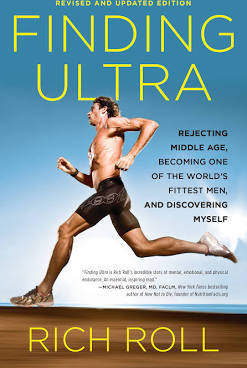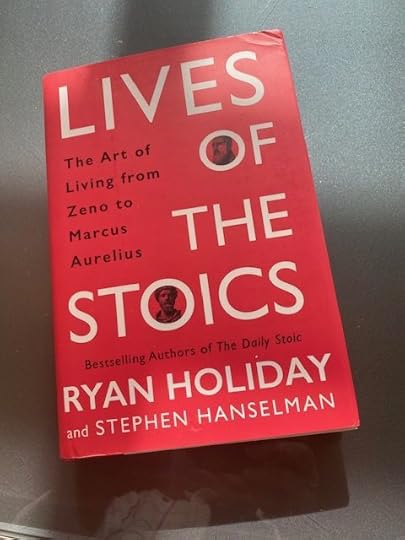Steven Pressfield's Blog, page 29
December 2, 2020
Recommending Rich Roll
I want to recommend a podcast to you. This is actually the only podcast I save every time and the only one I never miss.
Have you heard of Rich Roll?
I don’t know if I would call his book, Finding Ultra, an autobiography … but it’s certainly a tale of the ordeal of finding one’s calling—and a tremendous introduction to the man himself.

Rich Roll is an ultra-marathoner/swimmer/cyclist/Ironman/you-name-it endurance athlete who hit his stride at age fifty-one. He’s also a husband and father, a passionate advocate of plant-based nutrition, and much much more.
But the guests and subject matter of his podcasts range far more widely than what I’ve just hinted at.
Just in the past few weeks he’s interviewed Matthew McConaughey, Adam Skolnick, David Goggins, not to mention his own wife Julie Piatt (the latest of multiple times), who’s a fascinating personage in her own right.
I love the podcasts because I’m totally in synch with Rich’s point of view, his passions, and his curiosity about events, about politics, about how to live in these insanely trying times. He gets the guests that I myself would like to talk to, and he asks them the questions that I would ask if I were there.
And Rich Roll himself is a fascinating personality. He’s been up, he’s been down, he’s been sideways. He has reinvented himself over and over. And I would say (I’m not sure he’d agree) that in his mid-fifties he’s at the top of his game.

Myself, I’m not a podcaster. I never will be. I would not be good at it. But I love the idea of sitting across a table from an eclectic range of fascinating men and women … and digging into their heads to find out what they’re thinking right now, how they live their lives, what they feel about what’s going on in the world, and how they are taking action (or not) within all these spheres.
That’s the Rich Roll podcast. There are a lot of terrific podcasts out there, but his is the one I never miss.
The post Recommending Rich Roll first appeared on Steven Pressfield.
November 30, 2020
Episode Thirty-One: “And what will you keep for yourself, Alexander?”
Today, we’ll examine two more stories of Alexander … and see if we can learn how we was able, over ten years of war (during which the majority of his soldiers never saw their homes even for a brief leave or furlough) to maintain the passionate devotion of his officers and men.
The post Episode Thirty-One: "And what will you keep for yourself, Alexander?" first appeared on Steven Pressfield.
November 26, 2020
Episode Thirty: How Alexander Led
Alexander was twelve years old when horse dealers brought the great stallion Bucephalus, for sale, to his father Philips’s court in Macedonia.
The princes all agreed that the animal was spectacular.
But he was so wild, no one could even mount him.
Then Alexander stepped forward.
Nearly twenty years later, Alexander was still riding Bucephalus in battle, still in front of everyone else.
The post Episode Thirty: How Alexander Led first appeared on Steven Pressfield.
November 25, 2020
Ryan Holiday’s “Lives of the Stoics”
I’m going to recommend another book today. You may think, eyeballing the title, that it could have no place within our “writer’s bookshelf.” But it should sit, believe me, front and center.
First let me introduce you to Ryan Holiday, if you don’t know him already.

Ryan’s first book, which I absolutely loved, was Trust Me, I’m Lying. It was about Ryan’s nefarious career as a guerrilla-marketing scammer for American Apparel, the fashion company that was constantly in the news for ethical lapses, marketing overreach, etc. But Ryan took his netherworld experiences to a whole other level. He laid bare the structure of fake news (I mean REAL fake … deliberately fake) and how crazy stuff starts at the bottom of the social media food chain and rises, slimy inch by sleazy foot, to the mainstream media-verse, where it acquires credibility and goes on to contaminate and infect us all.
Then Ryan got into the ancient world, specifically the Stoic philosophy of Marcus Aurelius, Seneca, Epictetus, Zeno, Arrian, etc. He began writing books about this. He started a blog, The Daily Stoic. (This is the second blog I read every morning, right after Seth Godin’s.)
What is Stoic philosophy? (“Stoic” comes from the Greek word stoa, meaning a covered public portico, i.e. the shaded precincts in ancient Athens where the original “stoics” met each morning to teach and to debate.) In a nutshell, it’s this:
Memento mori. Remember always that you are mortal and that fortune cannot be controlled. Prepare yourself mentally for the worst that might happen. Then, if it does, you will not be destroyed by it.
Concern yourself only with those things you can control. Don’t drive yourself crazy worrying about stuff you can’t.
Amor fati. Embrace everything, good or bad, that comes your way. What matters is not what happens to you, but how you respond to it.
The Daily Stoic has influenced tens of thousands, including me. It’s not hard to see why. Stoicism is a philosophy made for chaotic times.
It’s also a powerful way of thinking for you and me as writers and artists.
Our working lives are by definition unstable, insecure, governed by forces often far beyond our control. How do we respond to this? One of Ryan’s titles is The Obstacle is the Way, a sentiment Marcus Aurelius or Seneca would embrace in a moment. In other words, that horrendous story problem/publishing setback/pandemic/economic meltdown that has just hammered you senseless is NOT a catastrophe. It is an opportunity for growth. The bad stuff leads to the good if we think of it rightly and act upon it with imagination and rectitude.
Lives of the Stoics by Ryan Holiday. Five stars for the book and five stars for the man.
The post Ryan Holiday's "Lives of the Stoics" first appeared on Steven Pressfield.
November 23, 2020
Episode Twenty-Nine: “With a King Like This to Lead Us…”
With today’s episode we’ll move on from the Spartans, the consummate Warrior Collective, to the paramount individual warrior in history—Alexander the Great.
Today we’ll tell two stories of Alexander that demonstrate his style of leadership and the ideals he aspired to as a man and as a king.
The post Episode Twenty-Nine: “With a King Like This to Lead Us…” first appeared on Steven Pressfield.
November 19, 2020
Episode Twenty-Eight: “I Will Tell His Majesty What a King Is…”
We will talk about the King archetype a lot as this series goes along.
Why?
Because at the center of all our psyches resides this paramount figure, upon whom our happiness, our honor, and the health and prosperity of our family and our country depend.
When the king is absent or unjust, the kingdom falls.
When the king rules with justice and wisdom, the kingdom prospers.
The post Episode Twenty-Eight: "I Will Tell His Majesty What a King Is..." first appeared on Steven Pressfield.
November 18, 2020
Notes from the Inner War
My girlfriend Diana and I were shooting a video for the “Warrior Archetype” series when we came upon this charming country cottage.
It reminded me of a place I once lived in, at a critical juncture in my long struggle to learn how to write.
We decided on the spur of the moment to shoot a video for “Writing Wednesdays” using this cottage as a backdrop.
Here it is:
Read more and view the transcript here.
The post Notes from the Inner War first appeared on Steven Pressfield.
November 16, 2020
Episode Twenty-Seven: The Virtue Of Selflessness
Certain warrior virtues are obvious.
Courage.
Fidelity.
Mental and emotional toughness.
But one that often gets overlooked is selflessness.
This ideal comes straight from ancient phalanx warfare, where a man’s shield protected not just himself but also the man on his right … and the unit was always more important than the individual.
The post Episode Twenty-Seven: The Virtue Of Selflessness first appeared on Steven Pressfield.
November 12, 2020
Episode Twenty-Six: We Are All Spartans
Why have we concentrated so intensely in this series on the 300 Spartans at Thermopylae?
Because you and I are in a battle too.
Like the Spartans, we know the outcome in advance.
No miracle will save us.
No truce, no negotiation, and certainly no “victory” will see us off the field alive.
Our question is the same as the Spartans’:
What are we going to do about it?
The post Episode Twenty-Six: We Are All Spartans first appeared on Steven Pressfield.
November 11, 2020
Seth Godin’s “The Practice”
There are certain books that we all should have on our Writer’s Bookshelf. Here’s one that I can’t recommend highly enough:
Seth Godin’s The Practice.

 Seth Godin. So good we need two of him.
Seth Godin. So good we need two of him.I’m a huge fan of Seth’s work and I have been since Tribes in 2008. Every book of Seth’s that I’ve read has advanced my understanding of what it means to be a professional and to be an ethical and moral contributor to my brothers and sisters and to the planet. The Dip, Purple Cow, Linchpin, This is Marketing … all great. I even have Seth’s 20-pound mastodon, What Does it Sound Like When You Change Your Mind? on my coffee table.
The Practice is in many ways the best of all. It’s for you and me. It’s for writers and artists. Most of Seth’s work—his blog, his podcast, his altMBA program, the many series he does on freelancing and entrepreneurship and other topics—casts a wide, ambitious net to include business people, marketers, anyone who aspires to “create a ruckus” (in Seth’s phrase) or make a real change in the world.
The Practice is about creative work exclusively. Seth’s premise (which I agree with 100%) is that doing the work is everything.
Success comes when you do the work.
Satisfaction comes when you do the work.
Fulfilment comes when you do the work.
“Practice” in Seth’s definition does not mean what you do in preparation for the Real Game, as in basketball practice or practicing playing the piano.
“The practice” is the game.
The practice is what you and I do every day when we enter our workspace, close the door, and sit down to pursue our dream.
The practice is lifelong. The practice transcends aspiration for success. The practice endures when everything else fades. The practice is personal. It is ours alone. It is sacred.
Observe any artist you admire—living or dead, male or female, wild-and-crazy or conventional and sane. Every one will have a practice, and if you ask them their secret, they’ll tell you, “I do it every day and nothing gets in the way of that.”
The Practice by Seth Godin. It sits beside my desktop and it should sit beside yours.
P.S. Seth’s blog is the first thing I read every morning. (The second is Ryan Holiday’s The Daily Stoic.)
The post Seth Godin's "The Practice" first appeared on Steven Pressfield.



